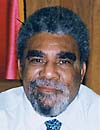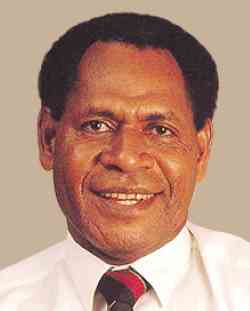Related Research Articles

Papua New Guinea, officially the Independent State of Papua New Guinea, is a country in Oceania that comprises the eastern half of the island of New Guinea and its offshore islands in Melanesia. It shares its only land border with Indonesia to the west and it is directly adjacent to Australia to the south and the Solomon Islands to the east. Its capital, located along its southeastern coast, is Port Moresby. The country is the world's third largest island country, with an area of 462,840 km2 (178,700 sq mi).

The economy of Papua New Guinea (PNG) is largely underdeveloped with the vast majority of the population living below the poverty line. However, according to the Asian Development Bank its GDP is expected to grow 3.4% in 2022 and 4.6% in 2023. It is dominated by the agricultural, forestry, and fishing sector and the minerals and energy extraction sector. The agricultural, forestry, and fishing sector accounts for most of the labour force of PNG while the minerals and energy extraction sector, including gold, copper, oil and natural gas is responsible for most of the export earnings.

The Kina is the currency of Papua New Guinea. It is divided into 100 toea. The name Kina is derived from Kuanua language of the Tolai region, referring to a callable pearl shell used widely for trading in both the Coastal and Highlands areas of the country.

Sir Mekere Morauta was a Papua New Guinean politician and economist who served as the 7th Prime Minister of Papua New Guinea from 1999 to 2002. Inheriting a depressed economy and a fractious legislature, he embarked on fundamental reforms of the country's economy and political system.

The University of Papua New Guinea (UPNG) is a university located in Port Moresby, capital of Papua New Guinea. It was established by ordinance of the Australian administration in 1965. This followed the Currie Commission which had enquired into higher education in Papua New Guinea. The University of Papua New Guinea Act No. 18, 1983 bill repealing the old Ordinance was passed by the National Parliament in August 1983.

The law of Papua New Guinea consists of the Constitution, ordinary statutes enacted by Parliament or adopted at independence from overseas and judge-made law.

The Supreme Court of Papua New Guinea has been the highest court of Papua New Guinea since 16 September 1975, replacing the pre-Independence Supreme Court and the overseas appellate tribunals from 1902 to 1975 of the High Court of Australia and the Judicial Committee of the Privy Council. Judges of the pre-Independence Supreme Court automatically became the first justices of the National Court and accordingly among the pool of judges that were available to be empanelled as a Supreme Court bench.
Chief Justice Sir Mari Kapi was a Papua New Guinean judge who served as the fourth Chief Justice of the Supreme Court of Papua New Guinea from 16 August 2003 until his retirement in 2008 due to health reasons. Kapi was the first Papua New Guinean citizen to be appointed as a judge and only the third PNG national to be appointed Chief Justice.

Sir Michael Thomas Somare was a Papua New Guinean politician. Widely called the "father of the nation", he was the first Prime Minister after independence. At the time of his death, Somare was also the longest-serving prime minister, having been in office for 17 years over three separate terms: from 1975 to 1980; from 1982 to 1985; and from 2002 to 2011. His political career spanned from 1968 until his retirement in 2017. Besides serving as PM, he was minister of foreign affairs, leader of the opposition and governor of East Sepik Province.
The Bank of Papua New Guinea is the central bank of Papua New Guinea, which has a core mandate to ensure price stability and maintain macroeconomic growth. To achieve this, it discharges four main functions; 1. responsible for the formulation and implementation of monetary policy, 2. ensure financial system development and stability, 3. ensure the payment system remain efficient, and 4. provide a banking role to the Government. It also manages the country's foreign reserves, issue the country's currency, manages the gold and foreign exchange of Papua New Guinea.

The monarchy of Papua New Guinea is a system of government in which a hereditary monarch is the sovereign and head of state of Papua New Guinea. The current Papua New Guinean monarch and head of state, since 8 September 2022, is King Charles III. As sovereign, he is the personal embodiment of the Papua New Guinean Crown. Although the person of the sovereign is equally shared with 14 other independent countries within the Commonwealth of Nations, each country's monarchy is separate and legally distinct. As a result, the current monarch is officially titled King of Papua New Guinea and, in this capacity, he and other members of the royal family undertake public and private functions domestically and abroad as representatives of Papua New Guinea. However, the King is the only member of the royal family with any constitutional role.

Sir Arnold Amet is a Papua New Guinean former politician and judge. He was a member of the National Parliament of Papua New Guinea from 2007 to 2012, representing the Madang Provincial seat. He was Minister for Justice and Attorney-General from 2010 to 2011. Prior to entering politics, he was Chief Justice of Papua New Guinea. In February 2021 he was nominated as the Allegiance Party candidate for the seat of Moresby North West District but was unsuccessful in securing the seat. He was awarded Knight Bachelor for service to the judiciary, law and justice in 1993.
Sir Salamo Injia is a retired Judge and former Chief Justice of Papua New Guinea. Injia was knighted in 2006 and appointed Chief Justice of the Supreme Court of Papua New Guinea in 2008, succeeding Mari Kapi. In 2018, Sir Gibbs Salika replaced him as the Chief Justice of Papua New Guinea. In August 2019, Injia was appointed chair of a commission of inquiry into a controversial state loan of US$1,200,000,000 from the Swiss bank UBS used by the PNG government to buy a stake in the resource company Oil Search.
Sir Brian Ernest Bell CSM, KBE, CStJ was an Australian-born businessman who established a business empire in Papua New Guinea.
Paul Tiensten is a former Papua New Guinean politician and former National Alliance Member of Parliament for Pomio Open. Tiensten is currently serving a nine-year sentence for corruption.
Sir Gibuna Gibbs Salika is the current Chief Justice of Papua New Guinea. He is currently the longest serving judge of the National and Supreme Court of Papua New Guinea.
Sir William John Francis Kearney, is a retired Australian judge who served on the supreme courts of Papua New Guinea and the Northern Territory in Australia.
Catherine Anne Davani was a Papua New Guinean judge. She was the first female to serve as a judge of the Supreme Court of Papua New Guinea from 2001 until her death.

The Papua New Guinea earthquake was a magnitude 7.5 earthquake that occurred in the Hela Province of Papua New Guinea on 26 February 2018, at 3:44 a.m. local time. The earthquake's epicenter was 10 kilometres (6.2 mi) west of the town of Komo. The maximum felt intensity was IX (Violent) on the Mercalli intensity scale. A total of 160 people were killed and many others were injured. An aftershock of M6.0 killed 11 people on 4 March, while another aftershock of M6.7 occurred at 00:13 local time on 7 March, killing at least 25 more. A 6.3 aftershock killed another 4 people on 7 April, more than a month after the first tremors hit the area.

Sir Henry ToRobert was a Papua New Guinean civil servant who was the first governor of the Bank of Papua New Guinea. He also played a major role in developing the Credit Corporation (PNG) Ltd and was president of the Papua New Guinea Olympic Committee for 30 years.
References
- ↑ "Former envoy sworn in as a judge - The National". The National. 3 December 2014. Retrieved 4 July 2018.
- ↑ "Sir Kina appointed president of law society - The National". The National. 19 November 2012. Retrieved 4 July 2018.
- ↑ "No. 53338". The London Gazette . 12 June 1993. p. 51.